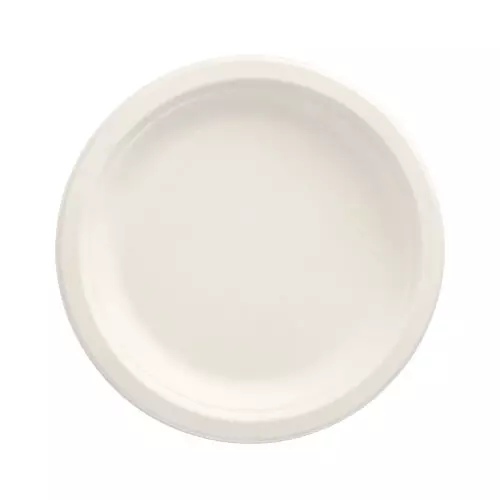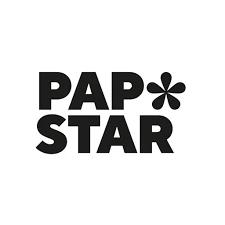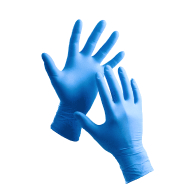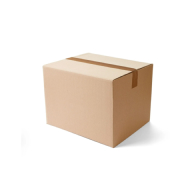Papstar Pure Plate, Sugarcane Undivided Ø 18 cm - 2 cm
PAPSTAR GmbH
visit storeProduct description
Sturdy disposable tableware made from sugar cane
Product features:
- Diameter: 18 cm
- Microwave-safe up to 800 W (maximum 2 minutes)
- Made from renewable raw materials
Sugar cane is an annually renewable plant. The plates and bowls are made from the remains of the sugar cane plant (bagasse), which are left over after the sugar juice has been extracted. Articles made from sugar cane are particularly stable and have a smooth, attractive surface.
Product certifications:
- Compostable according to EN 13432 for home composting
Safely holds hot meals, ensuring a convenient and mess-free dining experience.
Perfectly suited for serving salads, desserts, and other cold dishes, ensuring reliable containment and easy cleanup.
Determines the overall form of the tableware, affecting food presentation, storage efficiency, and suitability for different serving purposes.
Flat design provides a wide, stable surface, making serving and eating a variety of foods effortless and convenient.
Designed for efficient storage, stackable items save space and keep your supplies organized.
The visual appearance of the plate or bowl, ranging from natural kraft and white to various solid colors, transparent options, and decorative finishes.
The substance used to manufacture the plate or bowl, affecting durability, heat resistance, environmental impact, and disposal options.
Measures the width across the plate or bowl, determining serving capacity and portion size suitability for different food types and dining occasions.
Request a free sample
Test first and buy later. Visit any product page to request your free sample.
Standards and labels
EN 13432 is a European standard that sets out the requirements for the collection, transport and treatment of animal by-products not intended for human consumption. It covers the hygiene and safety requirements for these materials. The standard includes requirements for things like storage, transportation, and treatment of the by-products, as well as the equipment used in these processes. Possible test results would include measurements of things like temperature and pH to ensure that the by-products are being handled and treated properly.
Test results
Compostability PassedIn the standard EN 13432:2000, when a product receives a pass for compostability, it indicates that the product meets specific criteria for biodegradability, disintegration during composting, and the absence of negative effects on the composting process, including low levels of heavy metals and no adverse effects on plant growth. This standard outlines a rigorous test procedure where the biodegradation process of a material is quantified through measurements of CO2 evolution, with the requirement that at least 90% of the material must biodegrade within a specified time frame (usually six months). The disintegration is tested by composting the material and then screening the remaining fragments to ensure that no more than 10% of the original mass remains undecomposed on a dry matter basis after 12 weeks. The impact on compost quality is assessed through practical composting trials and ecotoxicity tests, ensuring that the compost can support plant growth without transmitting toxic substances. Consequently, products achieving a pass under this standard are considered environmentally benign at their end-of-life stage, contributing positively to the sustainability goals of waste management by returning biodegradable material to the natural ecological cycle effectively.
DIN Geprüft is a German term that means "Tested to DIN Standards." DIN stands for Deutsches Institut für Normung (German Institute for Standardization). In Europe, DIN Geprüft is a certification that signifies that a product has been tested and meets certain standards for safety, quality and performance set by DIN. The requirements for DIN Geprüft certification will vary depending on the specific product and standard.
Food safe refers to the safety of food products that are used or consumed by people. In Europe, food safety is regulated by the European Union (EU) and the European Food Safety Authority (EFSA). These organizations set standards and requirements for food products to ensure they are safe to eat. To be considered "food safe" in Europe, a product must meet these standards and be free of harmful substances. This includes being free of harmful bacteria, pesticides, and other contaminants. Food products that do not meet these standards cannot be sold or used in the EU.
PAPSTAR GmbH delivery terms
Free delivery when you order more than 150,00 € from PAPSTAR GmbH
Supplier shipping fee 6,68 €
Brand minimum 0,00 €
18,62 €
Price per 12 packages (144 pcs)
0,13 € / piece
Shipping fee is 6,68 € for orders under 150,00 €
A carton contains 12 packages (144 pieces)
Need larger quantities?
Other products you may like
Recently viewed
Need help?
Get help from our experts
Other products you may like
Similar products you may like
Autonomous sourcing platform
The most efficient way to source and order supplies for your operations
Sourcing
Ordering
List products you’re looking for and we’ll find the best products and prices for you – all for free.
Need help?
Get help from our experts



